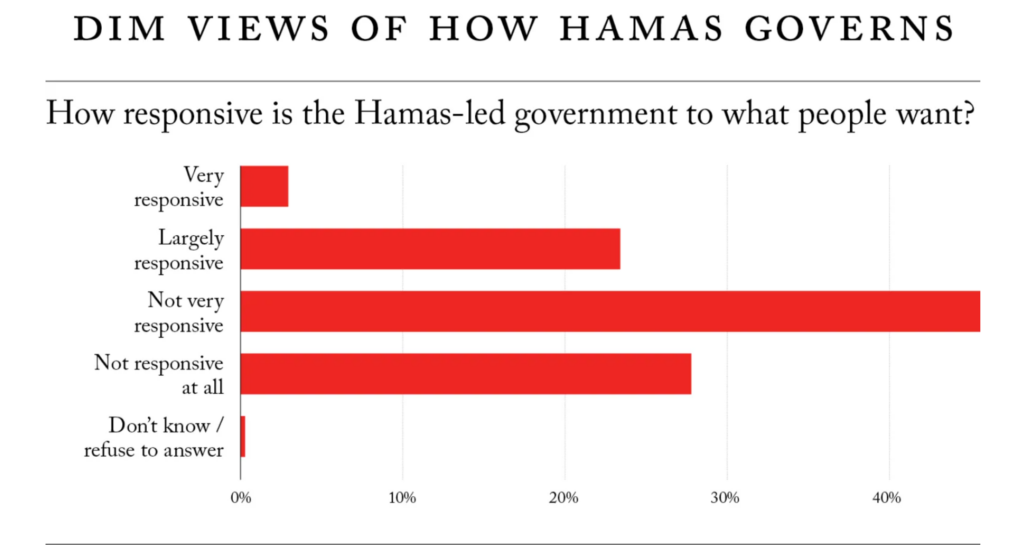
The argument that the entire population of Gaza can be held responsible for Hamas’s actions is quickly discredited when one looks at the facts, according to analysts Amaney A. Jamal and Michael Robbins.
Arab Barometer’s survey of the West Bank and Gaza, conducted in partnership with the Palestinian Center for Policy and Survey Research and with support from the National Endowment for Democracy, just days before the Israel-Hamas war broke out reveals that rather than supporting Hamas, the vast majority of Gazans have been frustrated with the armed group’s ineffective governance as they endure extreme economic hardship. Most Gazans do not align themselves with Hamas’s ideology, either. Unlike Hamas, whose goal is to destroy the Israeli state, the majority of survey respondents favored a two-state solution with an independent Palestine and Israel existing side by side, they write for Foreign Affairs:
- Asked to identify the amount of trust they had in the Hamas authorities, a plurality of respondents (44 percent) said they had no trust at all; “not a lot of trust” was the second most common response, at 23 percent. … 72 percent said there was a large (34 percent) or medium (38 percent) amount of corruption in government institutions…..
- When asked how they would vote if presidential elections were held in Gaza and the ballot featured Ismail Haniyeh, the leader of Hamas, Mahmoud Abbas, the president of the Palestinian Authority, and Marwan Barghouti, an imprisoned member of the central committee of Fatah, the party led by Abbas, only 24 percent of respondents said they would vote for Haniyeh. …..
- About half of Gazans expressed support for democracy: 48 percent affirmed that “democracy is always preferable to any other kind of government.” A smaller proportion of respondents (23 percent) indicated a lack of faith in any type of regime, agreeing with the statement, “For people like me, it doesn’t matter what kind of government we have.” Only 26 percent agreed that “under some circumstances, a non-democratic government can be preferable.”
 Palestinians lack a credible, responsible and corruption-free representative that puts their interests first, says The Washington Post’s Jennifer Rubin.
Palestinians lack a credible, responsible and corruption-free representative that puts their interests first, says The Washington Post’s Jennifer Rubin.
 “According to reputable polling, around 80 percent of Palestinians consider the PA corrupt, and 60 percent see it as a liability rather than an asset,” writes the Washington Institute’s Ghaith al-Omari, who is a former adviser to the PA. “None of its main institutions enjoys popular legitimacy, in part because presidential and legislative elections have not been held since 2005 and 2006, respectively.”
“According to reputable polling, around 80 percent of Palestinians consider the PA corrupt, and 60 percent see it as a liability rather than an asset,” writes the Washington Institute’s Ghaith al-Omari, who is a former adviser to the PA. “None of its main institutions enjoys popular legitimacy, in part because presidential and legislative elections have not been held since 2005 and 2006, respectively.”
If Palestinians “have real choices, viable choices between diplomacy and violence, good governance or Hamas’s authoritarianism, well, I think the answer is pretty clear,” adds Khalil Shikaki, the PCPSR’s Ramallah-based director. “The overwhelming majority would want diplomacy over violence. The overwhelming majority would want good governance over authoritarianism.”
 As an inveterate optimist, I hope that out of this crisis comes opportunity, says Robert Satloff, the Segal executive director of The Washington Institute for Near East Policy. Perhaps this opportunity is eventually to make in Gaza a reasonably well-functioning administration that puts first the needs of its citizens, and not the ideology of its rulers, he writes for American Purpose:
As an inveterate optimist, I hope that out of this crisis comes opportunity, says Robert Satloff, the Segal executive director of The Washington Institute for Near East Policy. Perhaps this opportunity is eventually to make in Gaza a reasonably well-functioning administration that puts first the needs of its citizens, and not the ideology of its rulers, he writes for American Purpose:
Maybe this is to repair the dysfunctional Palestinian Authority, so that it can one day assume its rightful responsibility as ruler of Gaza and peace partner with Israel. With luck, this opportunity is to squeeze the irrationality from Israel’s political system, so that its government reflects the generally sensible (if scarred views) of the vast middle of the electorate, and not its messianic or egomaniacal fringe. And possibly, this opportunity includes Arab states reverting from the frenzied populism of the day back to the constructive pattern of recent years, of defining their policies based on national interest.
Gazans’ opinions of the PA, which governs the West Bank, are not much better, Jamal and Robbins add. A slight majority (52 percent) believe the PA is a burden on the Palestinian people, and 67 percent would like to see Abbas resign. The people of Gaza are disillusioned not only with Hamas but with the entire Palestinian leadership. RTWT
A @NEDemocracy-funded @ArabBarometer survey shows that most Gazans reject @Hamas’s ideology. A majority favor a two-state solution with an independent #Palestine & #Israel co-existing side by side, @AmaneyJamal & Michael Robbins write for @ForeignAffairs. https://t.co/RICujP328r
— Democracy Digest (@demdigest) October 25, 2023







